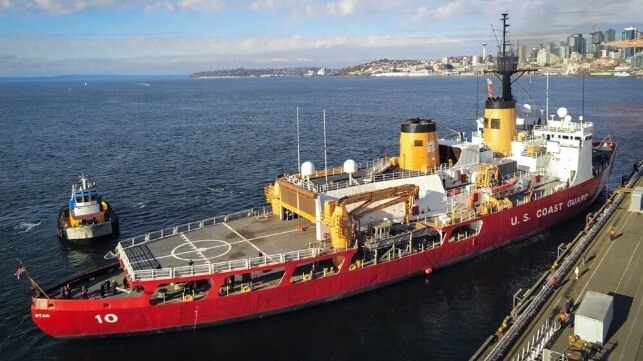America's Only Heavy Icebreaker Gets Under Way for Antarctic Mission

The U.S. Coast Guard heavy icebreaker USCGC Polar Star has departed on her annual mission to McMurdo Sound, Antarctica, where she will break out the harbor for America's main research station. This regular resupply run - Operation Deep Freeze - is an essential part of the National Science Foundation's activities on the frozen continent, and it will be the 27th time that the aging Polar Star makes the 24,000 nautical mile round trip run.
"This mission requires year-round effort from the crew to prepare this 47-year-old cutter for the 20,000 nautical mile round trip and extreme environmental conditions we will face. We have an incredible and dedicated team; I couldn’t be more excited or more proud to make this journey with them," said Capt. Keith Ropella, Polar Star's commanding officer.
As the sole remaining U.S. vessel capable of performing the NSF Antarctic supply mission, Polar Star must be kept running long beyond her design lifespan. The Coast Guard is building a series of replacement icebreakers, but the delivery of the first-in-class vessel has been delayed until 2028. Defense officials have noted that it has been five decades since the United States built a heavy icebreaker, and some of the special techniques have to be relearned. The Polar Star may well serve beyond her 50th anniversary.

that matters most
Get the latest maritime news delivered to your inbox daily.
Preservation of a ship of this age for a mission this rigorous is a substantial investment. Most ships go into drydock once every five years, but Polar Star undergoes a major yard period every year, spending months in overhaul status between operational deployments. This year, the service invested $15.6 million in upgrades and repairs over a 132-day stay in shipyard. In addition to work performed by contractors, the crew put in an "immense amount of time and effort" to get the icebreaker ready. The ship will likely spend up to 145 days under way, including 65 days in Antarctica.
Polar Star dates back to the Cold War era of defense technology, when solid-state analog control systems were state-of-the-art. Decades of rolling and vibration took a toll on these complex systems, and the Coast Guard has allocated $75 million in funding to replace Polar Star's cantankerous electronics and perform other deep-dive improvements. Upgrades began in 2021 and are now in year three of a five-year life extension plan.
